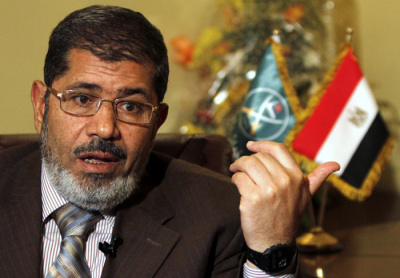Muslim Brotherhood's Morsi Declared Egypt President, Sparking Fears for Religious Minorities
The Muslim Brotherhood candidate in the Egypt presidential elections, Mohamed Morsi, has been officially declared the winner by election regulators. However, the result has immediately sparked concerns for religious minorities in the country, and whether the Brotherhood will look to build a conservative Islamic state.

Morsi won 51.73 percent of the vote, beating former Prime Minister Ahmed Shafiq in the run-off, the Higher Presidential Election Commission has reported. Farouq Sultan, who headed the panel of judges, reported Sunday that the commission upheld some of the 466 complaints by the candidates, but that they would not affect the election results, and Morsi's victory would stand.
The announcement sparked celebrations in Tahrir Square in Cairo, as Morsi's supporters gathered in jubilant mood.
However, many are skeptical of Egypt's future with the Brotherhood in the driving seat. The group has made well-known its goal to develop an Islamic state dictated by Shariah Law, and many believe Morsi will oversee a slow ebbing away of religious freedoms in the nation. Kurt J. Werthmuller, a research fellow at the Hudson Institute's Center for Religious Freedom has previously told The Christian Post, "A Morsi presidency would give more license to the Muslim Brotherhood to institute conservative Islamist policies in the country, and this would without a doubt make life more restrictive and discriminatory toward the Coptic Christian minority."
Many have been concerned that a Brotherhood-led presidency would eventually lead to harsher and more frequently enforced apostasy laws to fight against conversions from Islam. Others have also been skeptical that the Brotherhood would try to implement legislation such as anti-blasphemy laws that would stifle outward religious and intellectual dissent.
But for the moment, despite Morsi's victory, there still remains wider conflict between the Muslim Brotherhood and the generals of the ruling military council, and there are many issues that remain unresolved. The groups will have to agree a balance of power over government institutions and agree the nation's future constitution. Currently the presidential office that Morsi is stepping into has extremely limited powers, with the military-issued interim constitution wiping out a majority of the authority held by that office.
Hundreds of thousands have been gathered in Cairo's Tahrir Square over the past week demanding the military ruling council hand over power. Many had feared the military-led government would try to name Shafik as the election winner, as it continues its power struggle with the Brotherhood. It was already clear last weekend that Morsi had gained more votes than Shafik, but the delay had made many nervous and fearful over what would happen in the face of hundreds of complaints surrounding the elections.
The military council recently introduced two new decrees, dissolving parliament just ahead of last weekend's historic election and making moves this week to grant itself overwhelming authority over the presidency. Under the new decrees, the military generals will be given control over legislation and military affairs until a new parliamentary election is held. The move has been criticized by some as a "constitutional coup."
The Muslim Brotherhood victory will concern many in the region, and some Egyptian politicians have already been accusing the group of "hijacking" the nation's revolution. Although the Brotherhood has pledged to govern in coalition and respect individual and minority rights, many are skeptical and believe the group will look to create an Islamic state.
In particular, many have been questioning what the fate of the Coptic Christian community will be under the leadership of the Muslim Brotherhood.
Coptic Christians are a religious minority in Egypt who make up around 10 percent of the country's population of 85 million. For years, Copts have faced legal discrimination and sectarian attacks, resulting in their participation in last spring's protests on Tahrir Square to oust long-time Egyptian President Hosni Mubarak.
Like other political activists across Egypt, Copts protested Mubarak's rule in hopes of achieving a democratic state, as well as for further protections for their minority group. But the Brotherhood has not been shy about stating its desire for a more conservative Islamic state.
The Christian Post spoke to Kurt J. Werthmuller, a research fellow at the Hudson Institute's Center for Religious Freedom, regarding a Morsi victory and what a Muslim Brotherhood win might mean for the Coptic Christian community in Egypt.
Werthmuller told CP that having a party like the Brotherhood control Egypt's executive branch would likely signal tighter social restrictions that could impact the entire population.
"(A) Muslim Brotherhood-dominated government would probably begin to institute tighter societal restrictions – on speech and press freedoms, on the arts, etc. This would impact all Egyptians negatively," Werthmuller told CP.
The expert also said that he believes that with Morsi holding the executive seat, religious freedoms would slowly but surely be curtailed through implementation of a more "strident role" for conservative interpretations of Shariah law. Variations of this could occur through the use of harsher and more frequently enforced apostasy laws to fight against conversions from Islam, and through increased use of anti-blasphemy laws that would stifle outward religious and intellectual dissent.
"In other words, a Morsi presidency would give more license to the Muslim Brotherhood to institute conservative Islamist policies in the country, and this would without a doubt make life more restrictive and discriminatory toward the Coptic Christian minority," Werthmuller explained.
Morsi has sought to silence his critics over such fears and has publicly promised Christians equal protections under the law – but many Copts aren't buying it.
"There is a Brotherhood strategy to work toward building an Islamic country," one Copt told AP.
(Christian Post reporter Ivana Kvesic also contributed to this report)




























